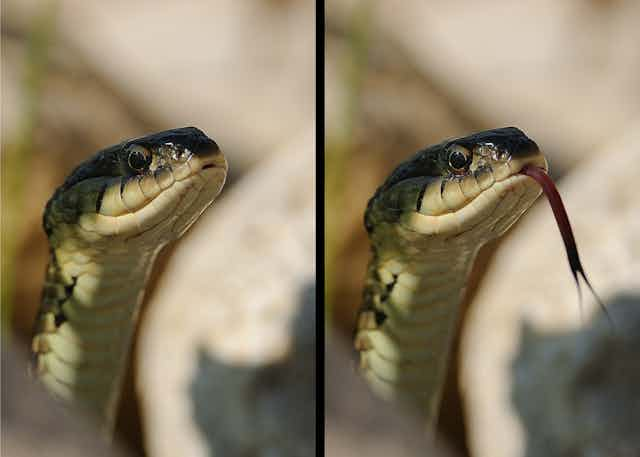This is an article from Curious Kids, a series for children. The Conversation is asking kids to send in questions they’d like an expert to answer. All questions are welcome – serious, weird or wacky!
How do snakes make an “sssssss” sound with their tongue poking out? – Lewis Maruno, age 4, Sydney.
Hi Lewis, that is an excellent question!
When a snake hisses, it is trying to say to animals that might threaten it: “leave me alone!”
At the same time, the snake needs to know what sort of animal it is dealing with, and a snake’s tongue is an important way for it to find out what is going on around it.
Although it might seem weird to you and me, snakes actually smell with their tongues! So, as you can see, it’s very important for a snake to be able to keep poking its tongue out (so it can keep smelling what’s around it), at the same time as hissing (to warn animals not to come too close).
Like you and me, a snake needs to keep breathing air to stay alive. Now, you might think that a snake’s tongue would get in the way of all that breathing, but, luckily for the snake, it doesn’t.
You see, while snakes do most of their smelling with their tongues, they do most of their breathing through their noses. Well, that’s true when they’re breathing normally, but it’s a little bit different when they’re huffing and puffing and trying to scare other animals.

Unlike humans, birds, and many other animals, snakes aren’t able to make many different sounds - hissing is about as close as a snake will ever get to speaking or singing. Like speaking and singing, though, the sound of a hiss comes from air passing in or out through the snake’s mouth, as well as its nose; a hiss is the sound of a snake breathing in or out really heavily.
We humans are lucky - we can make a lot of different noises, and even imitate the sound of a snake hissing. The way we make that noise is different to the way a snake does it though - we put our tongue behind our teeth when we hiss, but for a snake the tongue isn’t involved in making sounds at all.
Snakes can’t make a lot of different shapes with their mouths, which is part of why they can’t make a lot of different sounds.

They do have a special trick up their sleeves, though: a snake’s hiss can be really loud, and a little hole in their mouths is responsible for that extra volume.

Snakes can open their mouths really wide, either to make it extra clear that they want to be left alone, or to swallow a large meal. If you’re brave enough to look into a snake’s mouth (it’s safest with a photo!), you’ll see that little hole I was talking about, which makes their hiss really loud, and you’ll see their tongue, right underneath.
A snake’s tongue is really quite long and thin, and forked at the end (so they can tell which direction a smell is coming from), and it stays out of the way when they hiss.
Multitasking is hard but snakes are pretty good at it, really - they can hiss and poke their tongues out to their hearts’ content.
Hello, curious kids! Have you got a question you’d like an expert to answer? Ask an adult to send your question to us. They can:
* Email your question to curiouskids@theconversation.edu.au
* Tell us on Twitter by tagging @ConversationEDU with the hashtag #curiouskids, or
* Tell us on Facebook

Please tell us your name, age, and which city you live in. You can send an audio recording of your question too, if you want. Send as many questions as you like! We won’t be able to answer every question but we will do our best.

